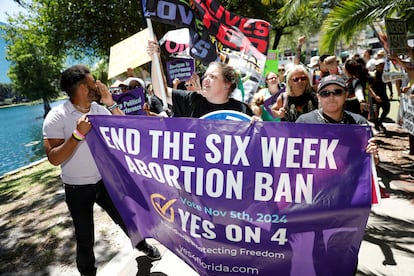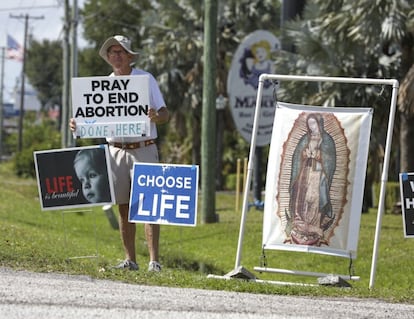DeSantis’ Heartbeat Protection Act banning abortion after six weeks goes into effect in Florida
The new law creates a huge desert for women’s reproductive health that spans the entire southern United States


Abortion after the sixth week of pregnancy is illegal in Florida as of Wednesday, after an April 1 ruling by the Florida Supreme Court went into effect, overturning earlier legislation that allowed pregnancy terminations during the first 15 weeks of gestation. Exceptions are made for cases where the mother’s life is at risk, rape, incest and human trafficking.
The entry into force of the Heartbeat Protection Act, so called because it sets the deadline for abortion around the time when the vital signs of the fetus are first detected, is practically equivalent to a total prohibition: most experts agree that many women do not even know they are pregnant at that point. This is the latest consequence of the June 2022 ruling with which the U.S. Supreme Court overturned Roe v. Wade, and with it, the federal protection of abortion rights. That ruling left behind a chaotic map after transferring the power to regulate the matter back to the states.
The new law, promoted and signed by Republican Governor Ron DeSantis — who is back to work after his failed adventure as a candidate for the Republican nomination to the White House — will have effects that transcend the borders of Florida, which had become a recipient of patients from other parts of the South. As of Wednesday, a gigantic desert is created for the sexual and reproductive freedom of women, which includes the states of Texas, Louisiana, Mississippi, Oklahoma, Alabama, Arkansas, Tennessee, Kentucky, Missouri and West Virginia, where the right to have an abortion is completely prohibited except in very rare cases, as well as Georgia and South Carolina, where it is not allowed after the sixth week.
So now a patient in, say, Key West, at the southern tip of Florida, will have to drive 14 hours to get to a clinic in Charlotte, on the South Carolina-North Carolina border, where pregnancy terminations are allowed up to the twelfth week, although with one condition: the law requires patients to wait 72 hours between the first and second consultations, a wait that seeks, according to its defenders, to give women time to reflect, despite the fact that 92% do not change their minds, according to a study by the Guttmacher Institute.
“This obligation greatly complicates the options for Florida women, especially those who are in a more disadvantaged position, and especially for the Latino population,” Michelle Quesada, vice president of communications for Planned Parenthood for South, East and North Florida explained in a telephone conversation. The organization has eight clinics in that part of the state (the third most populated and where Planned Parenthood is the largest provider of abortions). “Not only does it force them to travel to a very distant place, but it also requires a large outlay: they have to spend at least five days away from home, with their hotel nights and corresponding allowances, and ask for leave from work,” notes Quesada. “We must keep in mind that many of the women who abort already have children, and looking for someone to leave them with is an added problem.”

These obstacles, confirms Quesada — who explains that for the last month their doctors have been working at full capacity to provide service to their patients before Wednesday — pushes them to seek another option even a little further north: Virginia, a state where a Democratic victory in the legislative elections last November dampened the Republican Party’s aspiration to lower the abortion ban from the current 15 weeks to six.
Voting in November
The entry into force of the Heartbeat Protection Act is a victory for both Governor DeSantis and anti-abortion organizations in a state that has become solidly Republican in recent years. But the victory could have its months numbered. The same day that the Florida Supreme Court gave the green light to the legislation, its justices approved the text of an amendment that will be on the ballot in November, when in addition to electing the next tenant of the White House, residents of Florida will decide whether to enshrine a constitutional right to abortion before fetal viability.
The ballot summary reads: “No law shall prohibit, penalize, delay, or restrict abortion before viability or when necessary to protect the patient’s health, as determined by the patient’s healthcare provider. This amendment does not change the Legislature’s constitutional authority to require notification to a parent or guardian before a minor has an abortion.”
Anti-abortion organizations consider that the text is misleading and that it opens the door to pregnancies being interrupted until shortly before birth. “It is extremely radical,” says the radiologist Grazie Christie, who speaks on behalf of the Susan B. Anthony foundation, one of the most active in the United States against abortion. “The concept of viability is very vague. They did it on purpose,” she said in a telephone interview held this week. Christie admitted that there is medical consensus that the limit can be set at weeks 21 or 22, a deadline that was in effect in Florida until 2022. “The amendment says that abortions before viability can be done for any reason, and from then on, for health reasons, but this is where psychological health comes in, we have seen it in other states: that is, ‘I have a lot of anxiety, I can’t sleep, I’m worried sick’. It’s a crime.”
The vast majority of abortions are performed in the first 15 weeks. According to Planned Parenthood and other organizations, interruptions in the last trimester are mostly due to physical health reasons.
But Christie is also concerned that a constitutional amendment “is set in cement” because it is not easy to change. “If you don’t like the Heartbeat Protection Act, all you have to do is win the majority in Congress in Tallahassee and approve a new law. If we touch the Constitution, it is a very different thing,” she argues. To force the November vote, the associations promoting the referendum, including Planned Parenthood, had to gather 222,898 signatures. A 60% supermajority vote is required for the approval of the amendment. At this point, the polls are favorable to them. In November, voters will also be asked about the issue in New York and Maryland. Another 12 states are in the process of gathering signatures to get the decision on the ballot.
The strategy of resorting to arguments based on late abortions and the dangers for minors, shared by DeSantis, is reminiscent of the strategy followed by other campaigns. It happened in Michigan in 2022 and in Ohio last year. In both states, and in the other five in which voters have been allowed to decide on women’s reproductive freedom, the result was always the same: the reinforcement of abortion protection. Abortion promises to be one of the hottest topics in the campaign that will pit Donald Trump against Joe Biden barring any unforeseen events.
In the Democratic camp, the issue of abortion, which they trust will mobilize their bases and the undecided, is in the hands of Vice President Kamala Harris, who on Wednesday is scheduled to travel to Jacksonville for an event that will focus on the influence of reproductive freedom in elections. An (unlikely) Democratic victory in Florida would greatly help Biden’s aspirations to continue in the White House.
Sign up for our weekly newsletter to get more English-language news coverage from EL PAÍS USA Edition
Tu suscripción se está usando en otro dispositivo
¿Quieres añadir otro usuario a tu suscripción?
Si continúas leyendo en este dispositivo, no se podrá leer en el otro.
FlechaTu suscripción se está usando en otro dispositivo y solo puedes acceder a EL PAÍS desde un dispositivo a la vez.
Si quieres compartir tu cuenta, cambia tu suscripción a la modalidad Premium, así podrás añadir otro usuario. Cada uno accederá con su propia cuenta de email, lo que os permitirá personalizar vuestra experiencia en EL PAÍS.
¿Tienes una suscripción de empresa? Accede aquí para contratar más cuentas.
En el caso de no saber quién está usando tu cuenta, te recomendamos cambiar tu contraseña aquí.
Si decides continuar compartiendo tu cuenta, este mensaje se mostrará en tu dispositivo y en el de la otra persona que está usando tu cuenta de forma indefinida, afectando a tu experiencia de lectura. Puedes consultar aquí los términos y condiciones de la suscripción digital.








































